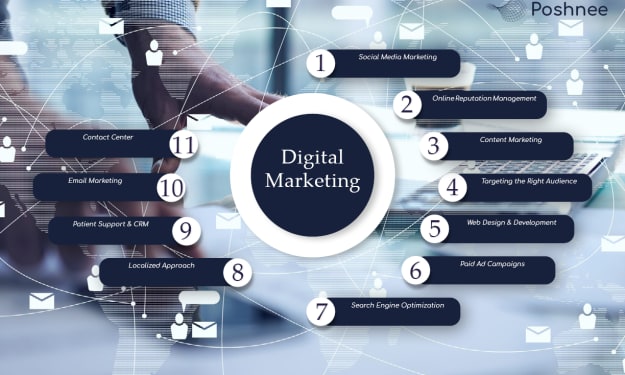Understanding Off-Page SEO - Poshnee Tech
On-Page and Off-Page SEO are two faces of one coin. Both are essential to each other, and to the larger purpose of helping you how to rank your website better in search engine results.

Understanding Off-Page SEO
Understanding Off-Page SEO - You have expertise in your niche. You also write great content. Your keyword research is on-spot. Your website is pretty fast and mobile-responsive. But still, the visitors are not coming. What could be the cause, you think?
Off-page SEO, we say. Search Engine Optimization (SEO) has two wings—on-page SEO and off-page SEO. We have covered the former in our previous blog. In this one, we will discuss how to complement on-page SEO with off-page SEO. Both are the two faces of one coin, essential to each other, and to the larger purpose of helping you rank your website better in search engine results.
So what is off-page SEO?
Off-page SEO is taking care of all the things outside your website in order to bring in more visitors. In the on-page SEO, you take actions visible to the visitors. It is taking actions that are well under your control. For instance, writing quality content, incorporating keywords properly, improving the performance of your website, etc., etc.
Off-page SEO, however, doesn’t concern itself with that—in the strictest sense. As Neil Patel puts it, “[It] simply tells Google what others think about your site. For example, if you’ve got a lot of valuable links pointing to your pages, search engines will assume that you’ve got great content – the type that provides value for users.”
It is more about building the trust of your website’s visitors through applying certain techniques. These techniques, once applied, increases the likelihood of making your website fare better in the SERPs (Search Engine Page Results). Unlike on-page SEO, you do not always have complete control over off-page SEO. It is not just you who help yourself—you involve third parties in the game too.
Let’s go through the key determinants of off-page SEO and explore the ways through which you can achieve the goal.
Backlinks
Search engines are not humans. They have to devise methods to give their users the best experience, to give them the kind of content that they cherish. Getting backlinks (aka link building) is one of those determinants by which the search engines discern the best-performing content from those having a poorer quality. What role word-of-mouth can play in brick-and-mortar business is what link building does in a digital setup.
Backlinks are an old technique still in fashion. It means getting a link to your website from other websites. It is like they vouch for your content, service, or product. Naturally, when many people point to a website, the search engine must give it weight.
Link building has two primary benefits. One, instant traffic. When you are mentioned in a blog, eBook, case studies, etc., the readers may happen to visit your website as well.
Two, they increases your domain authority. As we said earlier, when many websites give references to your website, it automatically gives you more power—called domain authority.
How to get backlinks?
Getting backlinks are easier said than done. Here are some ways through which you can get backlinks from other websites.
Original Content
Create original content. This way you compel other writers to refer to you. I mentioned Neil Patel above. Why? Because of his unique, fresh, and original content. At first, it is likely that even your best content will get ignored. But as you keep writing, the time will come that many blogs will mention your work. Remember, no website established authority overnight. It was their efforts that helped them where they are today.
Guest Posting
Another popular method is to start guest blogging. Find forums related to your niche. Write content for them and make a reference to your own website. It is a win-win for both. Your host website gets quality content; you get the much-needed links. Pretty great, right?
Asking for Links
When we say ‘ask for links’ we by no means encourage ‘link for link bargain’. Instead, we mean it to be done through the legal way. How to do that?
Find the keywords you want yourself to rank against. Next, find the forums and websites talking about those keywords. Reach out to the website owners and present your content to them. If they think that your content is link-worthy, they will offer a link or two (or many, depending on your content.)
Link-Worthy Visuals
This is another and the most effective way to get backlinks. Publish original images, graphs, infographics, and videos on your website. These are some of the things that a website aspiring to be authoritative would not publish without giving you the due credit. Even if they just mention your website name without giving you a link, your work is done (more on this later.)
What about buying links?
Last but not the least, links can be bought as well. But we discourage that for two reasons. First, it is unethical. Second, usually, the links offered are of low quality. By low quality, we mean the domain authority. When it comes to link building, the domain authority of the website giving you a link is the primary factor that helps search engines rank you. Secondly, the relevance. If you are a food company and you get links from a real estate company, it won’t make much sense—to the reader as well as the search engine.
The bottom line is: Try to build links through genuine white hat off-page SEO techniques and shun methods that would fall in grey or black area.
Social Signals
The next component of off-page SEO is social signals. Google’s official opinion on social signals is this: They do not add to your ranking. However, studies such as this one by Cognitive SEO do find a correlation between the social signals and your webpage ranking. We believe Google but here is how social signals can influence your ranking.
When many people like/follow your page, they will see your content. If the content is good, chances are that many of your followers will visit your website and probably share it on their social media handles as well. More share means more visitors. What do more website visits translate to? Domain authority.
So while social signals may not have a direct role in your ranking, it does have an indirect role. And quite a bigger role.
Brand Mentions
Another driver of off-page SEO is brand mentions. A website can point to you in two ways. Clickable (linked) mention where the reader can directly land on your website after clicking on the mention. We discussed its importance above.
Another way is unlinked mentions. Where a website just takes your name without linking to you. For instance, I am writing Solar Econo, a solar company, here. This is an unlinked mention.
Brand mentions even if unlinked have a value of their own. Google does factor them into its ranking algorithm as is evident from one of its patents available here.
Customer Reviews
Google values reviews. Especially if you have a mortar-and-brick presence as well. Even if your services are purely digital, here is how reviews can help you in off-page SEO.
One, they enhance your local SEO. If you have many reviews, your website is likely to rank higher against your target keyword in your area. Two, reviews build customer trust. Someone who trusts you will visit your website, read your content, and possibly share it. This in turn increases your authority.
Three, reviews positively influence click-through-rate (CTR) and purchase. And whether our website is educational or transactional, these are two of our end goals. So how about working on getting more positive reviews?
Last, more reviews mean more content on your website. More content translates to more keywords. At what cost? Almost free! Every time a user writes you a review, search engines are provided with fresh content to crawl.
To sum up, off-page SEO plays a huge role in your ranking. It can be improved through link building, social signals, brand mentions, and user reviews. This is not an exhaustive list and many other factors may—in fact, do—play a role. But SEO is not an on-time affair. As Stoney Degeyter put it, “You can’t just ‘SEO’ your website and be done. It’s a forever moving goal post.”
Note: We are updating our blog section. This blog is a part of our series titled ‘Digital Marketing Made Easy.’ Sign Up for our newsletter below and be the first one to read our latest updates, blogs, and all the things happening in the digital ecosystem. Our newsroom experts are constantly on the go to keep you up-to-date with all the techniques, tools, tricks, cheats (legal ones), and other necessary paraphernalia that would help your website rank better.
About the Creator
Poshnee Tech
Poshnee Tech. is a full-service digital marketing agency with a foremost emphasis on cutting-edge and innovative digital marketing solutions that fuel business growth. We specialize in SEO, PPC, Social Media Marketing.






Comments
There are no comments for this story
Be the first to respond and start the conversation.